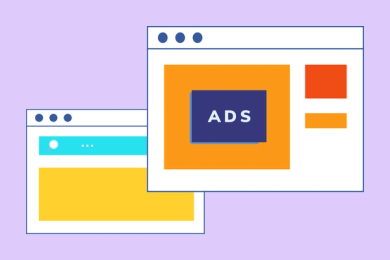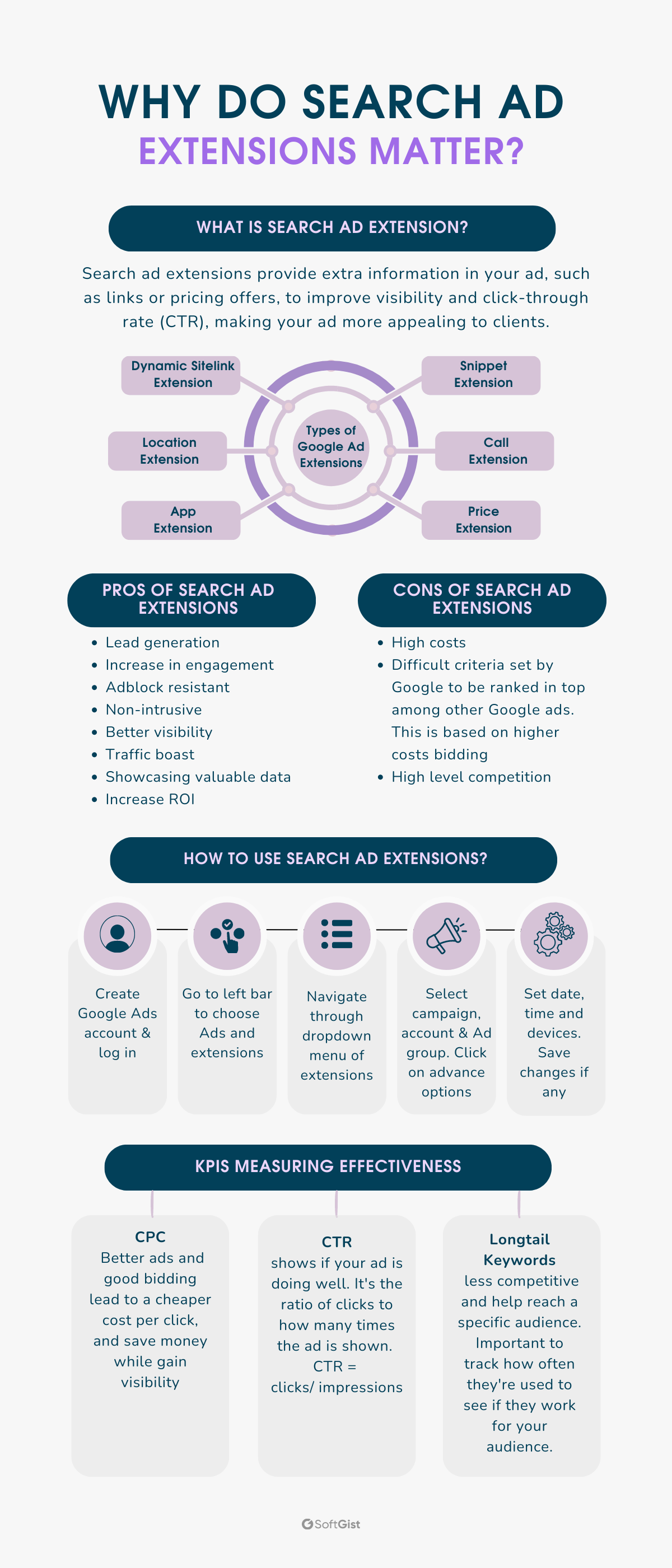Why Do Search Ad Extensions Matter?
Updated May 27, 2024
Published July 6, 2023

As an online business, you aim to build your brand’s visibility, reach your target audience, and increase your conversion rate. The good news is that you can do all that with the help of search ad extensions.
If you’re wondering, “Why do search ad extensions matter?” Well, they’re your ticket to boosting your website traffic, engagement levels, and lead generation.
If you’re investing in digital advertising, you can’t neglect search ad extensions. Fortunately, you can choose between several types, depending on your targeted niche.

Defining Search Ad Extensions
As their name suggests, search ad extensions are additional information within your ad. Rather than advertise your brand with a slogan and image, you can add more valuable data, like a link to your main page or pricing offers.
Overall, the search ad extensions aim to enhance your brand’s visibility and click-through rate (CTR). Clients are more likely to click on your ad if it contains more enticing details.
Types of Search Ad Extensions
You can implement multiple methods to attract clicks on your ad through these search extensions. There are two broad types of Google ad extensions: automated extensions and manual extensions.
Automated extensions are automatically enabled. They are created dynamically for your ad when Google predicts there is an opportunity to improve your ad performance.
Manual extensions are static and not automatically enabled.
Here are some of the most common Google ads extensions (both manual and automated extensions):
Dynamic Sitelink Extension
Whenever you see a search ad showing shoes, you’ll likely find a call-to-action (CTA) button below it. It’ll prompt you to the brand’s site page, where you can purchase the shoes you saw. The shoe brand is one step closer to securing your sale and increasing its conversion from that button.
It’s called a site link extension. You’ll want to redirect your clients to your brand’s site when creating the button. That way, it’ll enhance your potential leads’ user experience and garner more conversions.
Location Extension
If your business operates traditionally in a brick-and-mortar style rather than over the Internet, a location ad extension is your best bet. It’ll point your clients to your shop’s location and offer a contact number or email.
The extension should redirect leads to a map app where it’ll show directions to your shop. It can reveal other information like your business’ opening hours.
App Extension
An app extension directs users to download your brand’s application from an app store. Now, when creating this extension, your headline should link to your website.
In turn, users can get a better idea of what you’re advertising. Meanwhile, the app portion should redirect to the app store for easy access.
Snippet Extension
A structured snippet extension offers an enticing peek at what your business has to offer, such as products, services, courses, catalogs, and amenities. In turn, it needs to be high-quality and SEO-friendly text that’ll garner more views and CTRs.
The copy can include brief insights into your product’s features and category. Besides that, the headline attached to the snippet should be clear and concise.
Call Extension
Your business may depend on phone inquiries during the lead-generation process. Subsequently, you can include a business phone number extension below or above your ad. When clicked, it should redirect users to a mobile phone call.
Call extensions allow you direct contact with clients. It provides an opportunity to build repertoire and advance your lead down the sales funnel. That said, we highly recommend tracking these conversations to ensure the efficacy of the ad extension for your business.
Price Extension
Price extensions display your product’s price, whether it’s an offer deal or a tiered pricing system.
The ad feature is ideal when distinguishing yourself from a long list of competitors. Plus, customers prefer transparency when surveying search ads. It provides a straightforward ad with no hidden fees, fostering credibility.
Why Search Ad Extensions matter
Search ad extensions matter for several reasons. They could offer your brand the market break-in to reach your niche audiences. That said, some of the pros of using search ad extensions include:
Lead Generation
The most critical benefit of using search ad extensions is building leads. When someone clicks on your extension, they’re likely interested in your products and can potentially navigate to a landing page on your site.
Even though only 20% of your new leads will become customers, you’re establishing your brand among the other customers.
That said, the added value of extensions provides consumers with more to work with. They’ll know what they’re signing up for when clicking on your ad and are more likely purchasing clients.
Increased Engagement
Google ad extensions can greatly influence ad quality. The more relevant information your ad holds, the higher your CTR will likely become. If your ad is well-made with quality copy and transparent pricing, you’ll generate more clicks. According to Google, ad extensions can increase your CTR chance by 10 to 15%.
Besides that, you can use your ad’s CTR as a method to track your key performance index (KPI). It’ll show you whether your ad is successful or if you need to modify it to better suit your target audiences.
For instance, if you’re advertising luxury clothes, a shady ad with a low-quality image of the apparel won’t garner the CTRs you need.
Instead, if you showcase your products with professional-photographer images, a structured snippet, and a link extension, clients won’t be as hesitant to click on your ad.
AdBlock Resistant
One of the best parts about search ad extensions is that they’re AdBlock resistant. In turn, if your target leads have Ad Blockers installed, they’ll still receive your ad extensions.
That said, AdBlock particularly works on pop-ups or banner ads. Users will still be able to view and click on your ad extensions on their search engine results page (SERP).
Why? Ad extensions are closely linked to SERP. AdBlockers wouldn’t want to go near the page to avoid blocking information.
Non-Intrusive
You’re on a site and reading through an article when a pop-up suddenly blocks your view. These ads, rather than encourage clients to click on them, are often unwelcome.
Meanwhile, if you search for watches and find sponsored content or ad extensions related to the product, you’re more likely to click on the ad. It’s within your search intent.
Better Visibility
Your brand will get more visibility and reach with the extra ad space. It’ll lead to more engagement opportunities. If you use the relevant keywords to achieve a higher rank, you’ll gather more visibility to your intended audience.
Speaking of which, Google ad extensions offers a great example of intent marketing. It focuses on when customers are already searching for a product, and they find a relevant ad for it. In turn, they’re more likely to click on the ad.
Other types of ads might come across as more intrusive, earning fewer clicks and conversions, despite carrying more volume.
Showcasing More Valuable Data
Of the many perks ad extensions carry, valuable data is the most pertinent. Whether it’s a phone number, email, snippet, location, or site link, this information boosts your ad’s clickability.
Customers feel more at ease knowing more about your business rather than getting a pop-up of your brand’s name coupled with a generic image.
Traffic Boost
Search ad extensions redirect users to your business website. Subsequently, you’ll gather more traffic. The site link extension is an ideal remedy for slow organic search traffic.
Search ads are placed above the organic search page, giving you more room for visibility and site visitors. You can use your ad extension to target certain keywords, devices, and audience demographic.
Aside from that, you’ll want to keep your website visitors. For this reason, you can videos, which can increase the time spent on your website by 88%.
Increased Return On Investment (ROI)
Digital advertising can become pricey and lose its cost-effectiveness. Fortunately, search ad extensions will yield you a high ROI.
With the Pay-Per-Click (PPC) feature, you’ll only be charged when a lead clicks on your ad. Even if your leads don’t go all the way down your sales funnel, you’ll still generate website traffic.
Cons of Search Ad Extensions
Pros aside, you also need to consider the disadvantages of using search ad extensions. While they may set you back, you can remedy them through certain methods.
High Costs
You’re primarily paying for the PPC service when using search ad extensions. Each click can add up, especially if the keyword you’re using is highly competitive and you’ve reached a large audience.
That said, using Google ad extensions requires prior planning, in terms of bidding and pricing.
How Google Ad Auctions Work
Before you understand how to decrease your cost per click (CPC), you’ll need to understand how Google retrieves its chosen search ads.
- It all starts with a user’s search query. After they type the keywords and click enter, Google gathers all the ads with the same keyword.
- The search engine filters through them to toss out the unqualified batch, which includes those from different locations or violating certain policies.
- From the remaining ads, Google chooses the winners based on their Ad Rank. It’s calculated based on the ad’s quality and bid.
It’s worth noting that with every search, Google’s ad ranking and auction decisions change. Even if you bid a higher price, competitors can still earn a higher rank because of their higher ad quality.
How to Decrease CPC
You can decrease CPC by implementing a few tactics. They include:
- Increase ad quality score by enhancing it to appeal more to your target audience.
- Adding relevant landing pages to your links
- Increasing the page’s loading speed.
- Matching your ad copy to your target audience’s keyword search.
High-Level Competition
You’re not the only brand aiming for the top page position on a SERP. High levels of competition can inhibit your chances of getting a high CTR. To stay one step ahead of your competitors, you need to consistently remain on trend in terms of keywords.
Maintaining a search ad extension can consume lots of your effort, especially with the unpredictable algorithms of Google.
Consequently, you can’t expect to keep the same ad running for months without losing your rank. The ongoing process makes investing in Google ad extensions more challenging.
How to Use Search Ad Extensions
Luckily, creating a search ad extension isn’t too difficult to navigate. The real challenge comes from maintaining your ad relevance and Ad Rank. That said, here’s how to get started.
- Create a Google Ads account and log in.
- Go to the left bar and choose Ads & Extensions.
- Click on Extensions and navigate through the dropdown menu.
- You’ll find all the types of search ad extensions available.
- Pick the one you need by clicking on the “+” sign next to it.
- Each extension carries levels, including campaign, account, and ad group.
- Go to the advanced ad extension option and modify your ad more intricately.
- Choose your settings, such as start and end date and device preferences.
- Save any changes.
Measuring Your Search Ad Extensions’ Effectiveness
As with any business investment, you want to ensure that you can maximize your ROI. That’s why you need to measure your search ad extensions’ effectiveness at gathering more leads and providing traffic.
That said, you can measure your success with a few KPIs including:
CPC
Your CPC is an accurate determinant of how your ads are doing. Your ad quality and keyword bidding price will determine your CPC. The lower you pay per click, the more you’re saving money and gathering visibility.
CTR
A high CTR is always a good sign that your ad is performing successfully. It’s measured by dividing the number of clicks and the number of impressions or times it’s shown. For instance, if you have 500 views and get 100 clicks, your CTR is 5%.
Use of Long-Tail Keywords
Long-tail keywords are less competitive because they contain more than three words. For example, if you’re selling makeup, a long-tail keyword can be “matte pink lipstick.” That said, you’ll want to track how often your keywords are used to measure their effectiveness at attracting your niche demographic.
Final Thoughts
Why do search ad extensions matter? In short, these ad spaces provide a boost for your brand’s visibility, conversion rate, and ROI.
They offer multiple benefits your business will likely need to advance. You can choose between various types of ad extensions, depending on your model. For instance, if your business is e-commerce, you’ll want to increase website traffic and post price extensions.
Once you’ve created your ad and made your bid, then comes the hard part, keeping your ad space. With all the competitors out there, your brand needs to stand out, whether from your pricing option or enticing ad copy.
Share This Post
Ada Rivers
Ada Rivers is a senior writer and marketer with a Master’s in Global Marketing. She enjoys helping businesses reach their audience. In her free time, she likes hiking, cooking, and practicing yoga.
Allow cookies
This website uses cookies to enhance the user experience and for essential analytics purposes. By continuing to use the site, you agree to our use of cookies.
